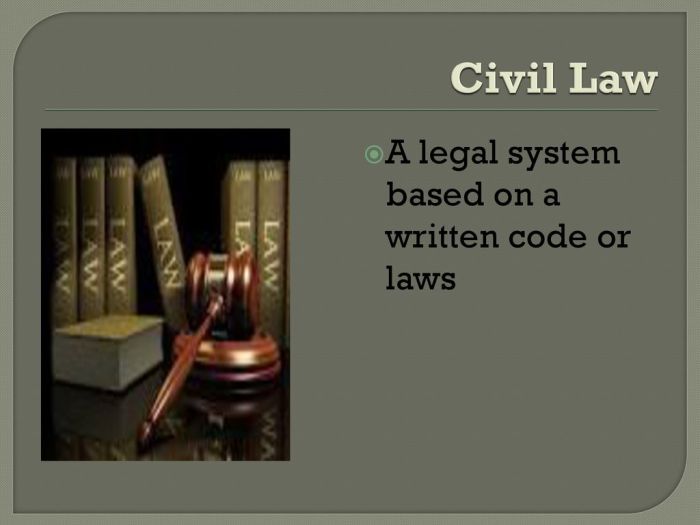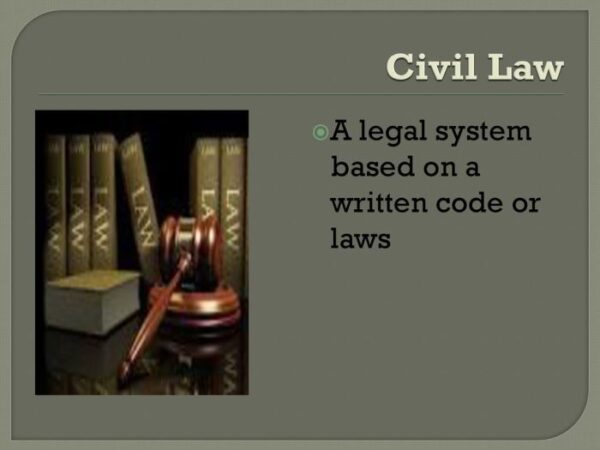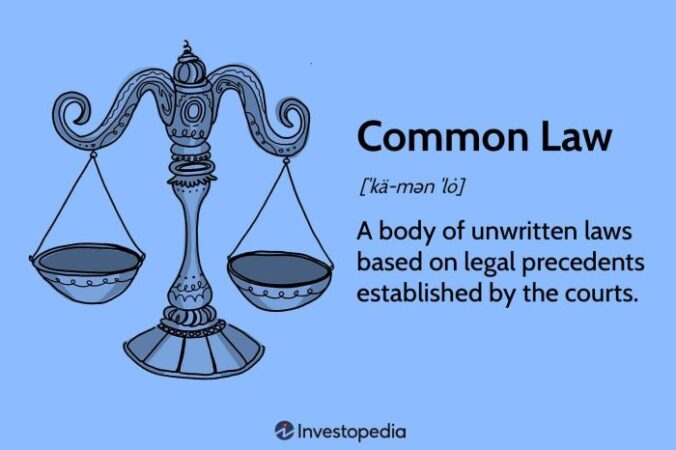
What is civil law system – What is a civil law system? It’s a legal framework that governs the world, shaping societies and influencing daily life. Rooted in ancient Roman law, it’s a system where laws are codified into comprehensive legal codes, serving as the primary source of legal authority. This approach contrasts with the common law system, where judicial precedent plays a significant role.
Civil law systems are characterized by a structured and hierarchical approach to legal decision-making. Judges primarily apply codified law, relying on legal scholars and academic writings for interpretation. The system emphasizes clarity and predictability, with legal proceedings adhering to strict procedural rules.
Introduction to Civil Law Systems

Civil law systems are a major legal tradition, influencing the legal frameworks of numerous countries around the world. They are characterized by a codified legal system, where laws are primarily derived from comprehensive written statutes and codes. This approach stands in contrast to common law systems, which rely heavily on judicial precedents and case law.
Origins and Historical Development
The roots of civil law systems can be traced back to ancient Roman law, specifically the Corpus Juris Civilis, a comprehensive compilation of Roman legal principles and statutes codified by Emperor Justinian in the 6th century AD. This body of law served as the foundation for legal systems in continental Europe and influenced the development of legal traditions in many other parts of the world.
During the Middle Ages, the study of Roman law experienced a revival, particularly in the universities of Bologna and Paris. This led to the emergence of a distinct legal profession, with scholars and jurists interpreting and applying Roman law to contemporary legal issues.
Key Principles and Characteristics
Civil law systems are characterized by several key principles and features:
- Codification: Laws are primarily codified in comprehensive legal codes, providing a systematic and accessible framework for legal rules and principles.
- Legislative Supremacy: The legislature plays a central role in shaping the law, with statutes and codes representing the primary source of legal authority.
- Inquisitorial System: The judicial process is generally inquisitorial, where the judge actively investigates the case and gathers evidence, rather than being a neutral arbiter between opposing parties.
- Emphasis on Written Law: Legal decisions are primarily based on written statutes and codes, with judicial precedents playing a less significant role compared to common law systems.
- Civil Code as the Foundation: Civil codes serve as the fundamental legal framework, providing a comprehensive set of rules governing various aspects of law, including property, contracts, family law, and criminal law.
Comparison with Common Law Systems
Civil law systems differ significantly from common law systems in several key aspects:
| Feature | Civil Law | Common Law |
|---|---|---|
| Source of Law | Codified statutes and codes | Judicial precedents and case law |
| Role of Legislature | Primary source of legal authority | Secondary source of legal authority |
| Judicial Process | Inquisitorial | Adversarial |
| Role of Precedents | Less significant | Highly significant |
| Legal Education | Emphasis on theoretical and doctrinal study of law | Emphasis on practical skills and case law analysis |
Examples of Civil Law Systems
Civil law systems are prevalent in many countries around the world, including:
- France
- Germany
- Italy
- Spain
- Japan
- China
- Brazil
- Mexico
Structure and Organization of Civil Law Systems: What Is Civil Law System
Civil law systems are characterized by their structured and codified approach to legal principles. This structure extends to the organization of courts, the roles of legal professionals, and the procedures for resolving legal disputes.
Court Structure and Judicial System
The judicial system in civil law countries typically follows a hierarchical structure, with courts organized into different levels based on their jurisdiction and the types of cases they handle. This hierarchy ensures a system of appeals and allows for the review of lower court decisions by higher courts.
- Lower Courts: These courts handle initial cases, such as those involving minor offenses, civil disputes, or family matters. They are often referred to as “trial courts” or “first instance courts.” Examples include local courts, magistrate courts, or district courts.
- Intermediate Courts: These courts hear appeals from lower courts and review their decisions. They may also handle specific types of cases, such as those involving commercial disputes or administrative matters. Examples include courts of appeal or high courts.
- Supreme Courts: These are the highest courts in the judicial hierarchy and have the final say on legal matters. They typically handle appeals from intermediate courts and may also have original jurisdiction over certain types of cases, such as those involving constitutional issues.
Roles of Legal Professionals
Civil law systems involve a distinct division of labor among legal professionals, each with specific roles and responsibilities.
- Judges: Judges play a central role in civil law systems. They are responsible for presiding over trials, applying the law to the facts of a case, and issuing judgments. Judges are often career professionals with specialized training in law and are expected to be impartial and independent in their decisions.
- Lawyers: Lawyers represent clients in legal proceedings, providing advice, drafting legal documents, and advocating for their interests. They are typically trained in legal theory and practice and are responsible for understanding and applying the relevant laws to their clients’ situations. In civil law systems, lawyers often play a more active role in presenting evidence and arguing legal points than in common law systems.
- Notaries: Notaries are public officials who are authorized to authenticate documents, witness signatures, and perform other legal acts. They play a significant role in civil law systems by ensuring the validity and authenticity of legal documents. Notaries may also be involved in legal proceedings, such as serving legal notices or taking depositions.
Legal Proceedings and Dispute Resolution
Civil law systems emphasize a structured and formal approach to legal proceedings. This approach aims to ensure fairness, predictability, and efficiency in resolving legal disputes.
- Written Pleadings: Legal proceedings in civil law systems typically begin with the exchange of written pleadings between the parties involved. These pleadings Artikel the legal arguments, evidence, and relief sought by each party. This emphasis on written documentation helps to establish a clear record of the case and allows for careful consideration of legal arguments before the trial.
- Evidence Presentation: The presentation of evidence in civil law trials is typically more formal than in common law systems. Judges play a more active role in controlling the evidence admitted and determining its relevance. Evidence is often presented through written documents, expert testimony, and witness statements.
- Judge’s Role: Judges in civil law systems are responsible for actively participating in the trial, questioning witnesses, and directing the proceedings. They are expected to be neutral and impartial and to ensure that the trial is conducted fairly and efficiently. They also have the power to issue judgments based on the evidence presented and the applicable law.
Key Areas of Civil Law

Civil law systems encompass a wide range of legal areas, each with its own set of principles and regulations. These areas are interconnected and often influence one another, providing a comprehensive framework for regulating societal interactions.
Contract Law
Contract law governs agreements between individuals or entities, establishing the legal framework for enforcing promises and obligations. Key principles include:
- Offer and Acceptance: A valid contract requires a clear offer and acceptance of the terms. This signifies mutual consent and intention to be bound by the agreement.
- Consideration: Each party must provide something of value in exchange for the other party’s promise. This can be a tangible good, a service, or even a promise to refrain from doing something.
- Capacity: Parties must have the legal capacity to enter into a contract. This means they must be of sound mind and not be under any legal disability, such as being a minor.
- Legality: The subject matter of the contract must be legal. Contracts that involve illegal activities are void.
Contracts can be written or oral, but written contracts provide stronger evidence of the agreement. Contract law also addresses remedies for breach of contract, such as damages or specific performance.
Property Law
Property law defines the rights and obligations associated with ownership of real estate and personal property. Key principles include:
- Ownership: Ownership grants the right to possess, use, and dispose of property. This can be absolute ownership or limited ownership, such as a leasehold.
- Possession: Possession is the physical control of property. While possession does not necessarily equate to ownership, it can be a significant factor in determining ownership rights.
- Easements: Easements are rights that allow one person to use another person’s property for a specific purpose. This can be for access, utilities, or other purposes.
- Mortgages: Mortgages are loans secured by real estate. The lender has a lien on the property, giving them the right to foreclose if the borrower defaults on the loan.
Property law also addresses issues such as inheritance, property taxes, and land use regulation.
Family Law
Family law regulates relationships between family members, including marriage, divorce, child custody, and adoption. Key principles include:
- Marriage: Marriage is a legal union between two individuals, recognized by the state. This creates rights and obligations for both spouses, including property rights, financial support, and inheritance rights.
- Divorce: Divorce is the legal dissolution of a marriage. It typically involves the division of property, child custody arrangements, and spousal support.
- Child Custody: Child custody refers to the legal rights and responsibilities of parents regarding their children. This can include physical custody (where the child lives) and legal custody (decision-making authority).
- Adoption: Adoption is the legal process of creating a parent-child relationship between individuals who are not biologically related. This involves a court order that terminates the biological parent’s rights and establishes the adoptive parent’s rights.
Family law is often influenced by cultural and societal norms, leading to variations in laws and practices across different jurisdictions.
Tort Law
Tort law deals with civil wrongs that cause harm to others. Key principles include:
- Negligence: Negligence occurs when someone fails to act with reasonable care, resulting in harm to another person. This can include failing to warn of a danger, failing to maintain a safe environment, or failing to act in a reasonable manner.
- Intentional Torts: Intentional torts are deliberate acts that cause harm to another person. Examples include battery, assault, false imprisonment, and defamation.
- Strict Liability: Strict liability applies in cases where someone is held liable for harm caused by their actions, even if they did not act negligently or intentionally. This applies to activities considered inherently dangerous, such as manufacturing explosives or owning wild animals.
Tort law provides remedies for victims of harm, such as damages for medical expenses, lost wages, and pain and suffering.
Contemporary Issues in Civil Law Systems
Civil law systems, while rooted in centuries-old traditions, are constantly evolving to address new challenges and adapt to a rapidly changing world. This section delves into some of the most pressing contemporary issues facing civil law systems worldwide.
Globalization and International Law, What is civil law system
Globalization has had a profound impact on civil law systems, leading to increased interaction and interdependence between countries. This has resulted in the need for harmonization of legal frameworks to facilitate cross-border transactions and resolve disputes. International law, including treaties and conventions, plays a crucial role in shaping this process.
- Harmonization of Laws: Globalization necessitates harmonization of legal frameworks to facilitate international trade, investment, and dispute resolution. The Hague Conference on Private International Law, the United Nations Commission on International Trade Law (UNCITRAL), and other international organizations play a vital role in this process.
- Influence of International Law: International law, particularly in areas such as human rights, environmental protection, and consumer protection, is increasingly influencing domestic legal systems. This can lead to the adoption of new legal principles and the reform of existing laws to align with international standards.
- Challenges of Balancing National Sovereignty and International Law: Balancing national sovereignty with the need for international cooperation and the enforcement of international law remains a significant challenge for civil law systems. This is particularly relevant in areas such as trade disputes, environmental protection, and human rights.
Technology and Innovation
The rapid advancements in technology and innovation are transforming legal systems worldwide. This includes the rise of artificial intelligence (AI), blockchain technology, and digital platforms, which are creating new legal challenges and opportunities.
- AI and Legal Practice: AI-powered tools are increasingly being used in legal practice, such as legal research, contract analysis, and due diligence. This has the potential to improve efficiency and accuracy but also raises concerns about bias, transparency, and accountability.
- Blockchain Technology and Contract Law: Blockchain technology, with its decentralized and tamper-proof nature, has the potential to revolutionize contract law. Smart contracts, which are self-executing agreements stored on a blockchain, could automate contractual processes and reduce the need for intermediaries.
- Cybersecurity and Data Protection: The increasing reliance on digital platforms raises concerns about cybersecurity and data protection. Civil law systems are grappling with how to regulate online platforms, protect personal data, and address issues related to cybercrime.
Emerging Legal Issues
The dynamic nature of society and the rapid pace of technological change continue to give rise to new legal issues that civil law systems need to address.
- Biotechnology and Genetic Engineering: Advancements in biotechnology and genetic engineering raise complex legal questions about intellectual property, medical ethics, and human rights.
- Artificial Intelligence and Legal Liability: The development of autonomous AI systems, such as self-driving cars, raises questions about legal liability in the event of accidents or other incidents.
- Climate Change and Environmental Law: The growing threat of climate change has led to a need for legal frameworks to address environmental protection, sustainable development, and climate justice.
Final Thoughts

Understanding civil law systems is crucial for navigating the complexities of the global legal landscape. From contract disputes to family matters, these systems shape how societies function and individuals interact. By delving into the origins, principles, and contemporary challenges of civil law, we gain valuable insights into a legal system that impacts billions of people worldwide.
Top FAQs
What are some examples of countries that use a civil law system?
Many countries worldwide utilize a civil law system, including France, Germany, Spain, Italy, China, Japan, and many Latin American nations.
How does civil law differ from common law?
While both systems aim to uphold justice, they differ in their primary sources of law. Civil law relies on codified laws, while common law emphasizes judicial precedent (decisions made by courts in previous cases).
What is the role of judges in a civil law system?
Judges in civil law systems are primarily responsible for applying the law as written in the legal codes. They are expected to be impartial and apply the law consistently, with less emphasis on creating new legal principles through their decisions.





